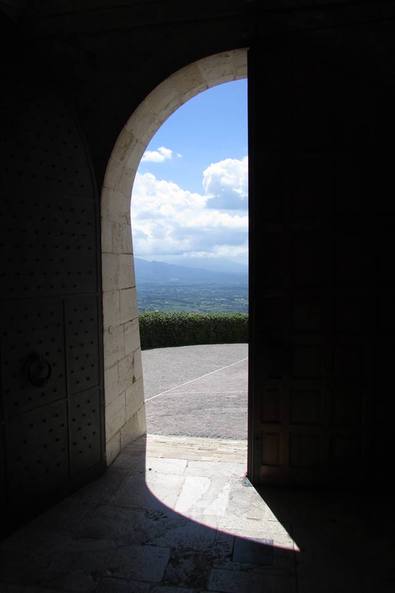Hospitality

Over these next few posts I'm hoping to share a few themes and practices I learned during this summer. These are my best attempts to distill all of my summer experiences and learnings into a few basic things to do.
Most think of the monastic world as remote and secluded, and in one way it is. What is surprising, though, is how welcoming monks are to guests. Whenever I call these places to see about visiting, there isn't any quiz to make sure I'm the right kind of person. If there's space, they tell me to come. When I was visiting St. Meinrad Archabbey, I explained to one of the monks who I was and what I was doing with the summer, and his reply was, "Welcome." There are basic instructions in the Rule of St. Benedict saying that all guests are to be received like Christ, and my experience is they all live that out. As a guest you don't have the run of the whole place; the monks' cloister is off limits, but you're welcome in the public areas to stay and worship.
As I've been thinking about what I've learned from my time this summer, I've thought of certain practices that I noticed among faithful Christians, and hospitality was first on my list. We associate the word hospitality with the restaurant and hotel industry, but I'm thinking of hospitality as the Greek word, philoxenia, which means to love the stranger. Where I saw faithfulness in action this summer, philoxenia was present and the stranger was loved. There were certain churches, like Eureka Christian Church and Hope Christian Church, who welcomed me when I was a stranger in their worship. The monks, in every monastery I visited, welcomed me and showed me hospitality.
Benedict's Rule points to why hospitality is important. All guests should be welcomed as Christ, "for he is going to say, "I came as a guest, and you received Me" (Matt. 25:35)" To welcome the guest is to welcome Christ's presence. Benedict's Rule gives extra instructions: "In the reception of the poor and of pilgrims the greatest care and solicitude should be shown, because it is especially in them that Christ is received." In the poor or those on pilgrimage, Christ's presence is especially found. When we welcome the stranger, we welcome Christ and the blessing Christ may bring. I often quote Hebrews 13:2, which reminds us not to neglect philoxenia, "for by doing that some have entertained angels without knowing it." I love this notion of angels showing up on our doorsteps, bringing us the blessing in drawing out our hospitality.
How is this lived out in church life? It's more than a greeter at the front door, which is a nice first step. It's more than a welcome packet for visitors, which--again--is nice, but not really getting it (I am still using the water bottle Saddleback Church gave me, though). Greeters and welcome packets and all that are nice steps (and I sure noticed when things like that weren't there), but what I'm talking about is a radical openness to the stranger that is lived out in the complete life of a church. So many churches are bunkered down against the world, afraid of what is lurking outside. When hospitality is lived out, there's an understanding that the outside might be where the blessing is waiting to be found. The new ethnic group moving in, the kids skateboarding on the church's parking lot, the special needs kid who shows up in worship disrupting the normal order--when these sort of folks are loved and welcomed, we meet Christ there and find the blessing.
I get into my routines and I often find outsiders' intrusions disruptive, but I've made a choice to change my attitude and to love and welcome the stranger when I can. I'm curious how my life might now be different with that attitude. How might a church change for the better with the basic attitude that they'll love the stranger whenever and however they can? It's worth a try.
"In drawing up its regulations, we hope to set down nothing harsh, nothing burdensome." - Rule of St. Benedict